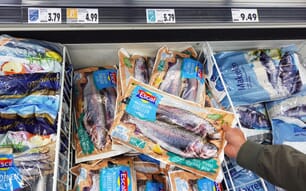The warning from the EC has come in the form of a “yellow card” distributed under the legal framework of the European Union’s IUU Regulation, which now puts these nations on a provisional list of non-cooperating countries in the fight against illegal fishing. Should the EC’s warning be further ignored, these countries may face a full seafood trade ban into the EU under a “red card” scenario.
Eszter Hidas, EU Policy Lead for WWF’s Transparent Seas Project, said: “This is not an exercise in singling out nations but rather, an exercise in enforcing effective implementation of international fishing laws and regulations. There must be consequences for those who continually avoid playing by the rules. The yellow card as in football provides a last chance to play a fair game or otherwise get kicked off the pitch.”
WWF supports this initiative by the EU, highlighting its effectiveness in promoting on-the-ground improvements in fisheries management practices. The organisation, however, also states that as a leading market for seafood products, the EU needs to demonstrate greater leadership, together with key actors such as the United States and Japan.
The Environmental Justice Foundation (EJF) also welcomed the announcement, but strongly encourages the United States and Japan to rapidly implement similar legal instruments to combat IUU fishing.. Executive Director, Steve Trent, said: “EJF welcomes the next step in the European Commission’s efforts to combat IUU fishing. As the world’s largest seafood market, the EU is right to act as a leader in this effort.
"The Philippines and Papua New Guinea now have an important opportunity to make rapid reforms to avoid receiving trade sanctions. They must make legal and regulatory changes that will send fishing operators a clear message that they cannot continue to degrade fish stocks, the wider marine environment and the livelihoods of coastal communities.
"Combined with more effective monitoring and oversight through a Global Record of fishing vessels, the prospect of trade restrictions represents an extremely effective tool in the fight to curb this devastating practice.
"It is now time for other major seafood market, including the United States and Japan, to join the EU in sending clear messages to poorly performing countries that they must improve. This will take the profit out of pirate fishing and benefit both the marine environment and the livelihoods and food security of those who depend on it,” he concluded.



